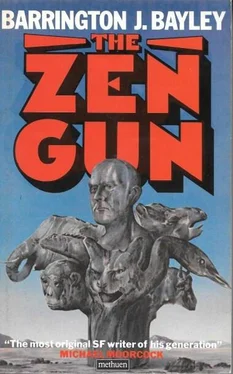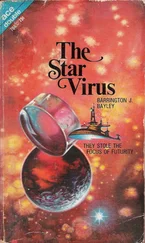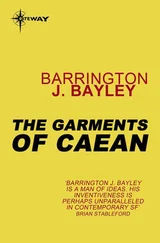Menshek, Archier told himself with a frown, was certainly out of tune with the time. It was one of present society’s articles of faith that, having received an intensive education up to the age of seven, a young person was thereafter as entitled as any adult with regard to social position, sexuality, or freedom of action. It was slightly shocking to hear Menshek talk so.
“Recently a twelve-year-old girl was sent out as Admiral of Twenty-Three-Fleet,” Menshek added, in a voice of mild disapproval. “You’ve probably heard of it—it was an attempt to put together a sixth fleet from scavenged or cannibalised vessels, not really a fleet at all. The reason she was Admiral was that she was the only pure-blooded human in the outfit.”
“Yes, I know of it,” Archier said. “I heard she performed very well, for the time Twenty-Three-Fleet was in operation. It failed mainly through having insufficient resources.”
“I agree the appointment was a success in her case,” Menshek conceded. “But what about the eight-year-old boy who became Three-Fleet’s Fire Command Officer… just before they invested Costor.”
“From what I hear he made an excellent Fire Command Officer.”
“But such lack of restraint! It was needless to wipe out half a planet like that—Costor’s ships weren’t that much of a danger!” Menshek made a face. “There was a committee of enquiry over it, you know. The boy had learned his skill on games machines. He hadn’t appreciated reality was different.”
“Adults can equally be carried away by excitement,” Archier pointed out. “Years don’t necessarily make one mature.”
“Well, you may be right… certainly it’s the fashionable view, or perhaps I should say the ‘social philosophy.’ Yet these ideological notions are what is killing the Empire. There’s no healthy pragmatism. The desperate shortage of pure humans, for instance, could be remedied in a perfectly straightforward manner simply by cloning them in whatever numbers are required. That would be the military solution. But we can’t do it because in the official purview every pure human must be a consequence of love, not merely practicality—that is, he must be willed into existence by his parents purely for his own sake. So this rules out mass cloning or extrahysterine growth of foetuses, except where it’s to avoid the inconvenience of pregnancy. And the plain fact is that few humans in Diadem are interested in the bother of raising children…”
Softly, Archier laughed. Much as he valued Menshek’s advice, he had to admit the older man had some crazy ideas. “Everything we’re striving to preserve would be gone if the human beings were to be produced by the state,” he objected. “It turns the whole purpose of life upside down—we’d be like ants or bees.”
Menshek shrugged. Changing the subject, Archier said, “I was wondering if you had any inkling as to the possible nature of this new weapon? It would have to be a large-scale development, wouldn’t it? Something huge, one imagines. Is Escoria Sector particularly skilled scientifically?”
“No, I don’t think so. It includes Earth, the original colonising planet, but I believe that’s a pretty quiet place. To destroy the Empire, one would have to destroy the fleets. So if there is a weapon, we shall probably encounter it in the coming engagement…”
Archier shuddered.
“On the other hand, the ‘weapon’ may not be physical at all,” Menshek mused. “As I have intimated, I think the Empire is more likely to be destroyed by ideas than by war. Already our social ideas render us an unlikely candidate for survival. Maybe Oracle has got wind of some new social message that has arisen in Escoria… in that case any battles we fight will be superfluous. We could even unknowingly import the weapon into the heart of Diadem when we levy taxes and tribute after a victory…”
“Need Oracle be so cryptic? And that could be true of any other region, couldn’t it?”
“Yes, it could, But in view of Oracle’s warning, 1 recommend we should interrogate all Escorians that are brought aboard, before shipping them to Diadem.”
Archier nodded. “I will remember your advice.”
By now the cat girl was bored with their talk. She strolled over to where Arctus was busy scanning reports on his desk screen. Over-familiarly, she stroked his trunk.
“Find me something to do, little elephant, I need some fun.”
Removing his trunk from her caress, Arctus gave her a sidewise glance from one of his small, peering eyes. “Have you no duty station?” he asked reprovingly. “You should have work to do.”
“But I’m a pleasure girl,” she said airily. “I’m one of Priapus’ People, that’s my duty.” She tossed her head. “The Admiral has other things to attend to, it seems.”
“Hmph. You should all have something more vital to do,” he grumbled. At this her mouth opened in mock amazement.
“What’s more vital than—? Just because you pachyderms only mate once a year or something… Perhaps that’s why your so serious.” But Arctus was ignoring her jibes. He keyed the screen, moving through the ship with a flurry, interpreting each flash-seconded scene with a practised eye.
“There’s a caryoline party going on on deck four, stateroom eighty-three,” he said. “Though really, you should be resting up for this evening’s relaxation.” Caryoline was an inhalant drug, similar in its action to cocaine, but with an added “sociability vector.”
Her eyes sparkled, “Oh, I love caryoline,” she said in a husky voice, “See you.”
She left the office, without bothering to retrieve any clothing, prowling with expectation. Menshek shared Arctus’ disapproval and frowned after her as she departed. It frustrated him that though Ten-Fleet was staffed by so few pure humans there were many more on board with no military role. Some, like Priapus’ People, were contracted entertainers, but others were hangers-on, along for the ride, for the fun of it, or merely happening to be visiting one of the ships when the fleet last set out from Diadem. The fleet was like a small city; when in dock citizens were able to come aboard without let or hindrance, and at outwards despatch date some did not bother to leave.
Menshek, like many of the animal officers, would dearly have liked to be able to press some of these passengers into service, but a first-class citizen from Diadem simply could not be coerced. Clearly many of them did not take the fleet’s role seriously; Archier had sometimes encountered an astonishing ignorance of what its actual business was.
And anyway, even if they were conscripted he doubted they would be much use. He felt safer with his animals.
Ten-Fleet was in Escoria, had announced its arrival by showering hydrogen-lithium grenades at random over an inhabited (though not densely so) planet. The rebel fleet had responded as anticipated to the outrage, by springing out of concealment to give challenge.
Now the two hurtled towards one another, and Admiral Archier decided on a pre-battle inspection tour of some of the larger of the one hundred and forty ships under his command. He and his entourage stepped from the intermat kiosk aboard the front-line-o’-war class vessel ICS Lilac Willow. Among the captain and officers who greeted them there sidled a small man of erect bearing whose hair hung in a neat fringe over his forehead. His loose toga-like garment, whose cut suggested he did not hail from Diadem, was daubed with what looked like bright paints of various colours.
Boldly the man approached Archier: In polite tones he asked if he might accompany the party into “the working areas of the ship.” “Particularly the engines and gunnery,” he added. “Your animals have kept me out of these places up to now.”
Читать дальше












